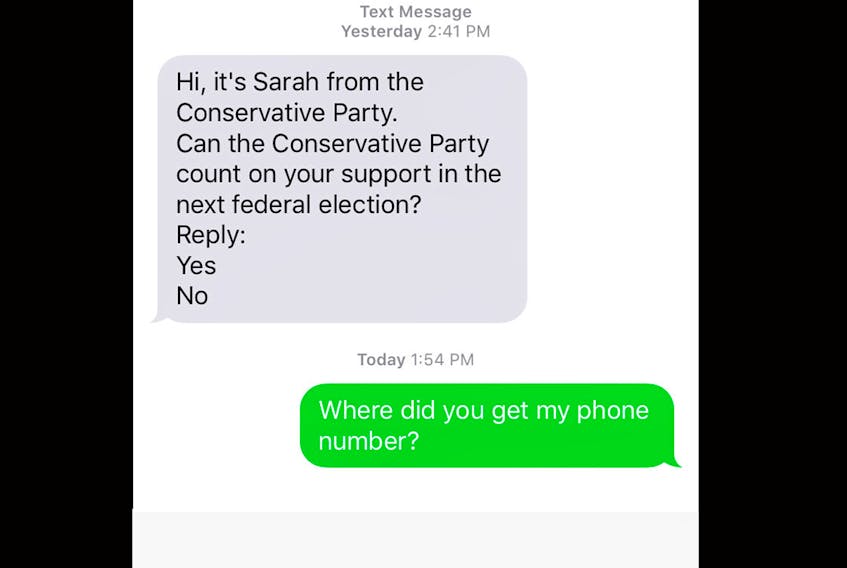With a federal election coming this fall and the summer season upon us, Canadians can expect to see their elected representatives showing up on a regular basis at community events to make sure their faces are seen as being active in the community.

I participated in a fundraising run for women's mental health in late June and one of the speakers was my local member of Parliament, who I have not laid eyes on since the last election, speaking about his government's support of this issue. Interacting with politicians in a public venue is to be expected at this time, but Canadians should have an expectation that their personal privacy will be respected by those who are or want to represent us in government. This doesn't always appear to be the case.
I received a text message in late June from a local number representing the Conservative Party of Canada and asking me to reply “yes” or “no” to whether I would be supporting them in the upcoming election; the next day, the person sharing my cellphone plan received the exact same message.
This was concerning, as neither of us had provided our personal numbers to the Conservatives – or to any political party for that matter – and we were left wondering where they got this information and what other private information about us they had obtained.
We need consistent rules for all the parties to follow, so we can know that our privacy rights are being respected by our leaders.
I later learned from an article in my local SaltWire Network paper that many others across Atlantic Canada had the same experience and that the Conservatives claim this campaign has been ongoing for months. They also claim they only used numbers people had given them and other numbers from a program that generates random numbers based on the first six digits which is apparently public information under something called the Canadian Numbering Plan.
While this is possible, I am highly skeptical that this is the case. If it is indeed random, it is curious that both of us living in the same household were randomly selected and that this experience was repeated across this region. What is more worrisome overall was learning from this article that political parties in Canada are not subject to Canada's Privacy Act and are therefore not required to at least reveal where they got my cellphone number. In fact, each political party is left to develop their own privacy policy and it is up to me to go looking for this information on their website to see if they are following the rules they have developed, a process that necessarily exposes me to the party's political messaging anyway.
Beyond the fact that political parties get to set their own rules when it comes to how they get and use our private information, it is just not acceptable that we have a Privacy Act that has such glaring holes contained in it. Over the past few years, there has been a lot of concern raised about large social media companies ,such as Facebook, and how they are using the private information of their users and it is clear that such information is often for sale to those who can afford it.
Some politicians have called for stricter regulation around these companies, which is all well and good. But we need to require our political parties to lead by example, not exempt themselves from such responsibility. While I got this text from the Conservatives, I would feel the same if it was any other party. We need consistent rules for all the parties to follow, so we can know that our privacy rights are being respected by our leaders.
If you should see a politician at an event this summer, be sure to raise this issue with them and try to get some kind of firm commitment to address this weakness in our privacy laws; it is your own privacy at stake and as recent events have shown, many of those who have access to your private information are not too concerned about what is best for you.
Brian Hodder is an LGBTQ2 activist and works in the field of mental health and addictions. He can be reached at [email protected].
RELATED
- RUSSELL WANGERSKY: Political parties must start playing by the privacy rules
- Conservatives' random texting campaign in N.S. raises privacy concerns: expert
- All of Canada's federal political parties collecting ‘vast amount’ of personal information
READ MORE FROM BRIAN HODDER









